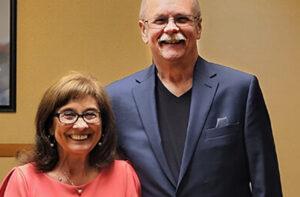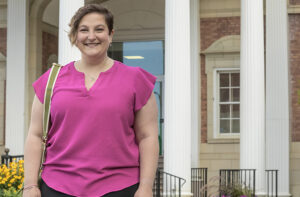Meet Felicia Woods
 Felicia Woods, of Watervliet, is the principal at Albany Leadership Charter High School for Girls, located on Hackett Boulevard near the Albany Med campus. When Woods was presented with the opportunity to take part in the campaign, she jumped at the chance. She said she feels it’s important to promote women’s health care, and she wants to be a positive role model for her female students.
Felicia Woods, of Watervliet, is the principal at Albany Leadership Charter High School for Girls, located on Hackett Boulevard near the Albany Med campus. When Woods was presented with the opportunity to take part in the campaign, she jumped at the chance. She said she feels it’s important to promote women’s health care, and she wants to be a positive role model for her female students.
“The first thing I thought was my students would see me and say, ‘Wow, someone I know and look up to is going to the doctor and making choices to better themselves, so maybe I should make those choices too.’” said Woods.
Woods says she also hopes to spread a positive message that helps combat social determinants of health.
“Growing up in downtown Albany, I witnessed a lot of people put aside their own health for their family needs,” said Woods. “I think it’s important that girls from that same area understand the importance of going to the doctor, getting the support they need, and being their voice.”
Woods says she enjoyed the commercial production process and working with Albany Medical Center doulas Nikita Shoemaker and Josie Hart. Since production wrapped, Woods welcomed her son – her fifth child – Zechariah.
Mom and baby are doing well!
Meet Sandie Carner-Shafran
 Sandie Carner-Shafran, of Mayfield, may have retired from her 38-year special education teaching career, but she still has a strong love of educating others. After her health changed in her early 70s, she wanted to make sure her female friends knew what options and treatments exist, specifically for their pelvic health.
Sandie Carner-Shafran, of Mayfield, may have retired from her 38-year special education teaching career, but she still has a strong love of educating others. After her health changed in her early 70s, she wanted to make sure her female friends knew what options and treatments exist, specifically for their pelvic health.
“I had never heard of a pelvic floor before,” said Carner-Shafran. “If you don’t hear about it, and don’t know about it, you can’t fix it or prevent it, and then all of a sudden you end up like me.”
Carner-Shafran is sharing her story after suffering from a condition where the muscles and tissues and ligaments supporting the pelvic organs weaken or loosen, causing the organs to drop or press into the vagina. She says it began as incontinence.
“I could actually feel my bladder, and I knew something wasn’t right,” she said. “It was affecting my life.”
After a series of tests, Carner-Shafran with pelvic organ prolapse. Carner-Shafron explored many options with her physician, Rebecca Rogers, MD, chair of the Department of Obstetrics & Gynecology, and she chose to have mesh inserted to hold up her vagina, so that the bladder and rectum would return to their normal positions. The mesh was tacked to her backbone.
Now years later, Carner-Shafran is feeling great and she’s passionate about sharing her experience with others.
Read more about the collaborative work being done in urogynecology in the Albany Med Health System.
Meet Giulia Pezzulo
 When Giulia Pezzulo found a lump in her breast in January 2022, she immediately thought “cancer.” She had previous experience with finding lumps during self-exams—a fast-growing fibroid was removed in 2014. This time a series of tests confirmed it was breast cancer. She was 31 years old.
When Giulia Pezzulo found a lump in her breast in January 2022, she immediately thought “cancer.” She had previous experience with finding lumps during self-exams—a fast-growing fibroid was removed in 2014. This time a series of tests confirmed it was breast cancer. She was 31 years old.
She met with Lynn Choi, MD, breast surgeon and director of Albany Medical Center’s Breast Care Center, and her team. Together they came up with a treatment plan, beginning with chemotherapy.
With advances in breast cancer treatment, including targeted chemotherapies and immunotherapy, which are available in the Albany Med Health System, it’s more important than ever to get screened.
“The beauty of a mammogram is you can detect and diagnose cancer at very early stages, significantly increasing the chances of survival,” said Dr. Choi.
Before she could start treatment, since Pezzulo was of child-bearing age, she needed to decide about potential future children. She underwent IVF treatment and had a successful egg retrieval. Soon after, she began chemo. At her second session, Pezzulo made another decision—to shave her head instead of watching her hair fall out in clumps.
“I thought it would be horrible, but it was actually very empowering,” she said. She wore a pink wig to chemo for the rest of the summer. “Why not dress up? If I am going to be in a horrible situation, I might as well have fun.”
After chemotherapy, Pezzulo had a singular mastectomy and axillary lymph node dissection, a surgical procedure that removes lymph nodes from the armpit to check for cancer spread. Doctors found seven of those nodes to test positive for cancer. This finding allowed her team to further tailor the follow-up radiation.
“Each patient is unique, and we are committed to providing quality, compassionate individualized breast health care for the best possible outcomes,” said Dr. Choi. She connected Pezzulo to local support organizations that provided gift cards for dinner and baskets of comfort items and invited her to Siena College’s Pink Zone Basketball Game where she met dozens of other survivors.
Today Pezzulo is healthy. She had reconstruction and revision surgery this year, takes several medications as part of her treatment, and has screenings every six months, alternating between MRIs and mammograms.






